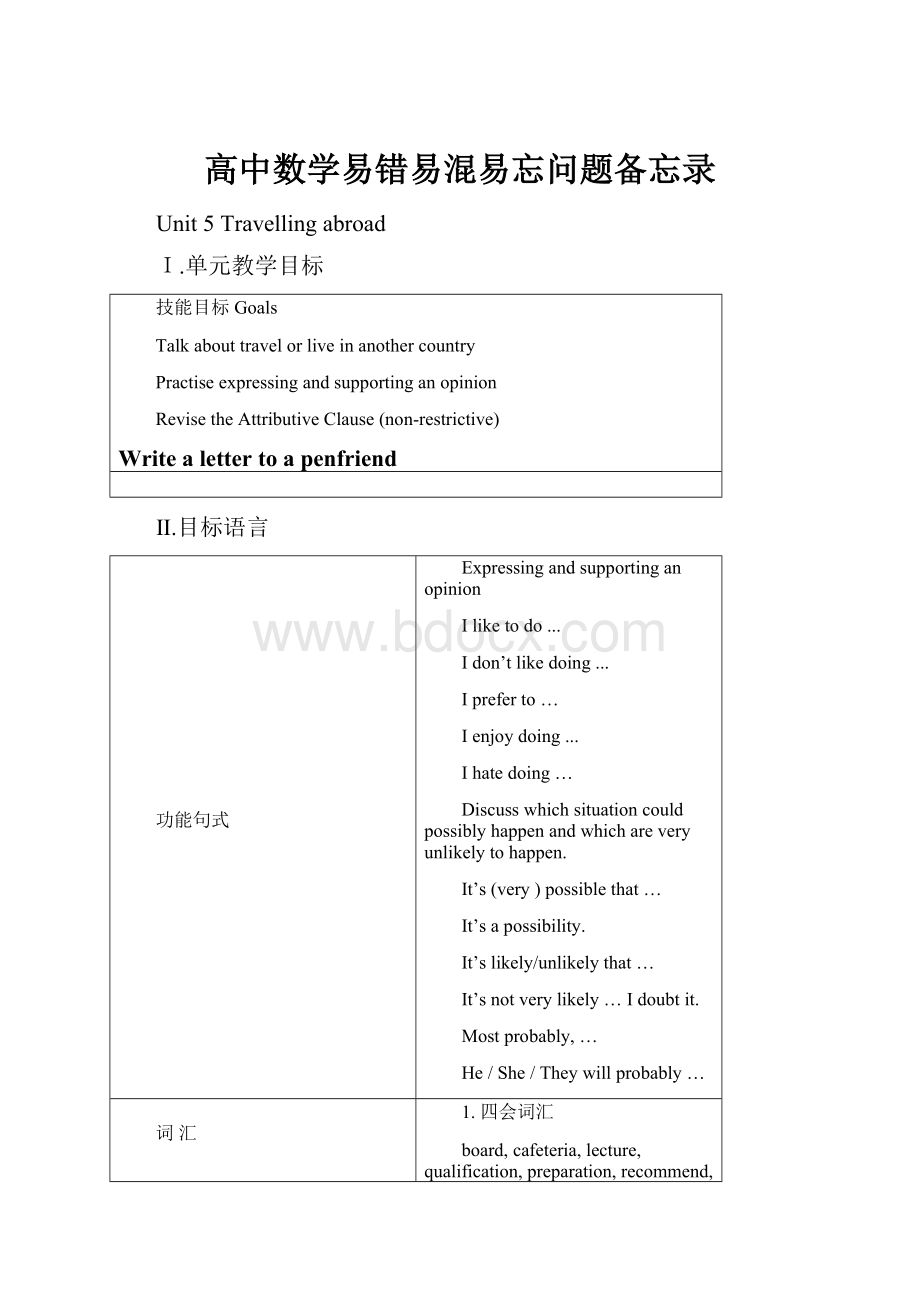 高中数学易错易混易忘问题备忘录.docx
高中数学易错易混易忘问题备忘录.docx
- 文档编号:25060664
- 上传时间:2023-06-04
- 格式:DOCX
- 页数:10
- 大小:21.15KB
高中数学易错易混易忘问题备忘录.docx
《高中数学易错易混易忘问题备忘录.docx》由会员分享,可在线阅读,更多相关《高中数学易错易混易忘问题备忘录.docx(10页珍藏版)》请在冰豆网上搜索。

高中数学易错易混易忘问题备忘录
Unit5Travellingabroad
I.单元教学目标
技能目标Goals
Talkabouttravelorliveinanothercountry
Practiseexpressingandsupportinganopinion
RevisetheAttributiveClause(non-restrictive)
Writealettertoapenfriend
Ⅱ.目标语言
功能句式
Expressingandsupportinganopinion
Iliketodo...
Idon’tlikedoing...
Ipreferto…
Ienjoydoing...
Ihatedoing…
Discusswhichsituationcouldpossiblyhappenandwhichareveryunlikelytohappen.
It’s(very)possiblethat…
It’sapossibility.
It’slikely/unlikelythat…
It’snotverylikely…Idoubtit.
Mostprobably,…
He/She/Theywillprobably…
词汇
1.四会词汇
board,cafeteria,lecture,qualification,preparation,recommend,shopkeeper,comfort,substitute,academic,requirement,tutor,numb,acknowledge,occupy,hopefully,enterprise,succeed,comment,passport,visa,agent,parallel,abundant,govern,destination
2.认读词汇
summarize,Lima,Cuzco,theAndes,Peru,Lia,LakeTiticaca,IncaEmpire,MachuPicchu,Puno,theAmazonJungle
3.词组
adjustto,keepitup,fitin,(get/be)usedto,asfarasoneisconcerned,feelathome,travelagent,settlein
4.重点词汇
board,preparation,recommend,substitute,occupy,enterprise,comment,destination
结构
AttributiveClauses
(2)—RevisetheAttributiveClause(non-restrictive)
非限制性定语从句
重点句子
Itwasthefirsttimeshehadeverleftherhomecountry,…P38
XieLei,whois21yearsold,hascometoouruniversity
tocompleteabusinessqualification.P38
It’snotjuststudythat’sdifficult.Youhavetogetusedto
awholenewwayoflife,whichcantakeupallyour….P38
Ihavebeensooccupiedgettingusedtoeverything
thatIhaven’thadtimeforsocialactivities.….P39
I’mgoingtojoinafewuniversityclubsandhopefully
I’llmeetsomepeopleIhavethingsincommonwith.…P39
WhydoesLiapreferto…?
Ilike/don’tlikedoing/todo…
Ipreferto…
III.教材分析与教材重组
1.教材分析
本单元以travellingabroad为话题,旨在通过单元教学,使学生了解在国外旅行或学习时可能会遇到的一些问题,并学会怎样去解决问题和避免这样问题的发生。
学会表达和支持个人观点,能用所学的有关travellingabroad的词汇描述在国外居住生活的情况,在国外旅游时能根据所给的信息选择恰当的旅游线路,能推测什么事情可能会发生,哪种情况不会发生,会正确使用非限制性定于从句。
1.1WARMINGUP提供了四个有关旅行的问题,让学生用已有的知识和经验讨论在国外居住或旅行会遇到什么问题,并且该如何来解决这些问题。
1.2PRE-READING是READING的热身活动。
提供了两个问题,它要求采用与同学讨论交流的方式谈论在国外学习的利与弊,激发同学们的学习兴趣。
1.3READING是一篇介绍中国女孩谢蕾在伦敦学习的情况。
使学生对比在国内学习与在国外学习的不同。
TrytounderstandsomeofthebenefitsanddifficultiesshehasinLondon.
1.4COMPREHENDING
练习1通过四个问题来检查学生对课文的细节的理解。
练习2以图表的形式来分析在国外学习的利与弊。
练习3设置了五个讨论题,通过这些话题的谈论,挖掘文章的深层含义,激活学生自身的认知能力和思想认识能力。
练习4是概括能力训练题,在理解的基础上,重点训练学生的概括能力。
1.5LEARNINGABOUTLANGUAGE分词汇和语法两部分。
其中,Discoveringusefulwordsandexpressions是训练学生在语境中掌握词汇的能力,帮助学生加强动词变化形式的意识。
Revisingusefulstructures是关于非限制性定于从句,旨在训练学生对定语从句的理解、掌握和运用,并通过语法练习加以巩固。
1.8USINGLANGUAGE中的第一部分Listening要求学生先根据秘鲁的地图谈论有关秘鲁这个国家的一些情况,然后完成三个相应的任务型练习。
首先是要求学生在听第一遍时能完成听力练习1的任务,即:
选择那些是Lia喜欢做的事;听第二遍是要求学生回答五个问题;练习3是填空题。
通过这些题,培养学生学会获取听力材料中的具体用词和细节要点,同时让学生了解有关Peru这个国家的一些情况,为下面的readingandspeaking作铺垫。
第二部分Readingandspeaking作为一个整体教学材料。
阅读部分主要依据地图对秘鲁这个国家进行介绍,要求学生skim(togetthemainidea),再scan(togetthedetails),然后回答3个Wh-问题。
然后为大家提供了一个旅游小册子,其内容包括在秘鲁旅游的四条路线。
要求学生在读后根据文章细节回答四个问题。
Speaking部分主要是设置了一个情景yourgroupplanstospendeightdaysinandaroundCuzco。
要求学生依据所提供的旅游手册来选择适合自己团队的旅游路线。
进一步了解有关旅游的一些注意事项,并学会表达计划和任务。
这是一个任务型训练题,旨在培养学生的口语表达能力和实践能力。
1.9WRITING要求学生给一位即将到中国来学习的美国笔友写一封信,在信中向他介绍中国的一些情况,在中国的学习、生活中可能会遇到的问题及解决问题的办法,告诉他怎样更好的学习中国的文化以及你将提供给他的帮助。
2.教材重组
2.1从话题内容上分析,WARMINGUP与READING相一致;而从训练目的上分析与TALKING比较一致。
从教材份量来说,可将WARMINGUP与Workbook中的TALKING,SPEAKINGTASK整合在一起,设计成一节任务型“口语课”。
2.2可将PRE-READING,READING与COMPREHENDING三个活动整合在一起上一节“阅读课”。
2.3USINGLANGUAGE中的Listening与Readingandspeaking都是谈论有关秘鲁这个国家,介绍秘鲁的景色以及在秘鲁旅行的几条路线,内容一致,所以放在一起,设计成一节"听说课"。
2.4可将LEARNINGABOUTLANGUAGE与Workbook中的LISINGSTRUCTURES语法练习题整合在一起上一节“语法课”。
2.5可将Workbook中的Listening与ReadingTask与WritingTask整合起来,上一节“综合实践课”。
2.6将WRITING与LearningTip与Workbook中Project整合成一节“写作课”。
3.课型设计与课时分配(经教材分析,根据学情,本单元可以用六课时教完)
1stperiodSpeaking
2ndperiodReading
3rdperiodListeningandSpeaking
4thperiodGrammar
5thperiodIntegratingskills
6thperiodWriting
Ⅳ.分课时教案
TheFirstPeriodSpeaking
Teachinggoals教学目标
1.Targetlanguage目标语言:
a.重点词汇和短语adjustto,advantage,findout,youthhostels,community
b.交际用语expressingandsupportinganopinion
Youmight…
It’sapossibility...
Probably…
It’s(very)possiblethat...
Itcouldhappen.
Mostprobably...
It’snotverylikely…Idoubtit.
He/She/Theywillprobably...
2.Abilitygoals能力目标
Enablethestudentstodiscusswhattheywouldlearnwhentravelingorlivinginanothercountry.Andhowtodealwiththeproblemsanddangersthatcouldhappenwhiletravelinginaforeigncountry.
3.Learningabilitygoals学能目标
Helpthestudentslearnhowtodealwiththeproblemthattheycouldmeetwhiletraveling..
Teachingimportantpoints教学重点
Letstudentslearntousethestructuresofexpressingandsolvetheproblems.
Teachingdifficultpoints教学难点
Howtodealwiththeproblemsthatarelikelytohappenwhentravelingandhowtopreventthem.
Teachingmethods教学方法
1.Lookingatthequestions.(individuals).
2.Pairsworktodiscussandworkingroupsoffour.
(task-based,cooperativelearning).
Teachingaids教具准备
1.Acomputer2.Aprojector
Teachingprocedures&ways教学过程与方法
StepIGreetingandRevision
T:
Goodmorning/afternoon,boysandgirls!
First,let’scheckthehomework.
1.Checkwhethertheyhaverememberedthetenimportantsentences.
2.Checkwhethertheyhavepreviewedthenewwordsandexpressionsinthisunit.
StepIIWarmingup
*Talkabouttheproblemswiththeteacher’shelp.
T:
Ifyouhadchancetogoabroadintheworld,whichcountrywouldyouliketovisitandwhy?
andwhatkindofthingswouldyoumeetorlearnbest?
LookattheproblemsonPage37.Youcandiscussthefollowingquestionswithyourpartner.
Qs:
1.Ifyoucouldgoanywhereintheworld,whichcountrywouldyouliketovisitandwhy?
2.Whatkindofthingswouldyoulearnbestbybeingatouristinacountryandwhatwouldyoulearnbestbyworkingorstudyingthere?
3.Howdifferencesoreasydoyouthinkitistoadjusttolivingortravelinginanothercountry?
Whatkindofdifferencesmightyouexperience?
4.Haveyoutalkedtoanyonewhohasspentsometimeinanothercountry?
Whatdidtheyfindunusualordifficultaboutit?
Discussion
Sa:
IfIhadchancetotravelabroad,I’dliketovisitNewZealand.It’ssaidthatit’sabeautifulcountry,I’dliketoenjoythebeautifulsceneryinNewZealand.
Sb:
IfIhadchance,I’dliketogotoAmerica.MaybeitisbetterifIcouldworkorstudythere,thenIcouldlearnEnglishwell.
Sc:
I‘dliketogotoEgypt,becauseIwanttoknowabouttheancientculture.
T:
Whatkindofthingswouldyoulearnbestbybeingatouristinacountryandwhatwouldyoulearnbestbyworkingorstudyingthere?
Sa:
Whenwetraveltoanothercountry,maybewecouldknowaboutthearchitectureofthecountry,thebeautifulscenery,theeconomicsituationandsoon.
Sb:
Whenweworkorstudyinthecountry,maybewecouldknowmoreaboutthemannersandcustomsofthecountry.WecouldlearnthestandardEnglishbetter,wecouldcommunicatewiththelocalpeopletoimproveourEnglish.
Sc:
Ifwecouldlivewiththelocalpeople,wecouldknowtheproprietiesofthecountry,knowmoreslang,knowthedifferenceintime,food,transportationetc.betweenthetwocountries.
T:
Verygood.Youcanthinksomanythings.Haveyoutalkedtoanyonewhohasspentsometimeinanothercountry?
Whatdidtheyfindunusualordifficultaboutit?
Ss:
Well,Ihavetalkedtomyfriendwhohadbeentoaforeigncountry,hetoldmesomethingdifferentorinterestingintheforeigncountry.Forexample,inIndia,mostpeopledon’teatmeat,especialbeef,theyliketoeatvegetablesandfruits,soifyouinviteanIndianfordinner,neverordersteakforthem.
StepIIISpeaking
T:
Well,wetalkedaboutthethingsthatwecouldlearnwhilewetravelingorstudyinginaforeigncountry.Then,whatkindofproblemsordangerswouldhappenwhiletravelinginaforeigncountry?
Now,turnatpagetoP82,trytolistthedangersandproblems,thendiscusswaysyoucouldpreventthesethingshappeningingroups.Thefollowingsentencepatternsarehelpfulforyou:
Youmight…Mostprobably,…
It’sapossibility…It’slikely/unlikelythat…
Probably,…It’snotverylikely…Idoubtit.
It’s(very)possible…He/She/Theywillprobably.
Itcouldhappen.
(Afterafewminutes)
T:
Well,areyouready?
Who’dliketoshowusyouropinion?
Sa:
Whiletraveling,it’spossiblethatyoucouldloseyouway,becauseyoudon’tknowthecountryverywell.Topreventthis:
◆You’dbettertakeamapofthecountrywithyou.
◆Don’tleavealonewithoutsayingaword.
◆Payattentiontotheconspicuoussigns,forexample,somefamousbuildings,somespecialroadsignssothatyoucanaskthewaywhileyouarelost.
Sb:
It’slikelythatwecouldmeetmalefactors---robber,thieforothers.Probably,wewillbehurt.Topreventthis:
◆Don’tshowyourvaluablebelongingstoothers.
◆You’dbettergoalongwithotherpeople.
◆Shouldyoufacedangers,connectthepolice.
Sc:
It’s(very)possiblethatwecouldhavedifficultyincommunicatingwiththelocalpeople.Topreventthis:
◆Trytograspthesimpleandbasiccommunicatedlanguage
◆Trytoknowaboutthemannersandcustomsofthecountry
◆Trytobefamiliarwithformalityineverydaylife
StepIVTalking(若时间不足,可改为作业)
T:
OK!
Somuchforthequestions.Youdidaverygoodjob,I’msurethatyouhaveknownhowtodealwiththeproblemswhiletravelingorstudyinginaforeigncountry.Ifwewantedtravelalonewithalittlemoney,couldyoufindagoodwaytosavemoney?
Sa:
Ma
- 配套讲稿:
如PPT文件的首页显示word图标,表示该PPT已包含配套word讲稿。双击word图标可打开word文档。
- 特殊限制:
部分文档作品中含有的国旗、国徽等图片,仅作为作品整体效果示例展示,禁止商用。设计者仅对作品中独创性部分享有著作权。
- 关 键 词:
- 高中数学 易错易混易忘 问题 备忘录
 冰豆网所有资源均是用户自行上传分享,仅供网友学习交流,未经上传用户书面授权,请勿作他用。
冰豆网所有资源均是用户自行上传分享,仅供网友学习交流,未经上传用户书面授权,请勿作他用。


 《初级会计实务》试题题库大全及答案详解.docx
《初级会计实务》试题题库大全及答案详解.docx
